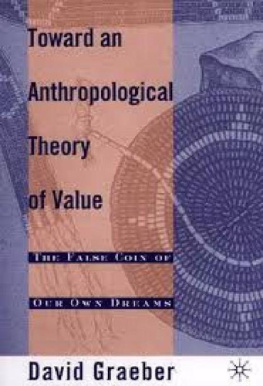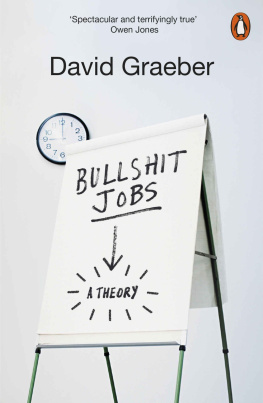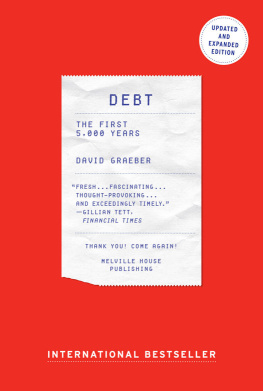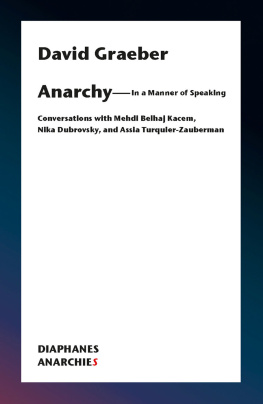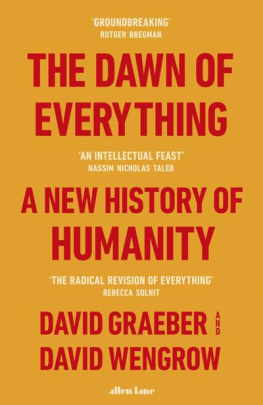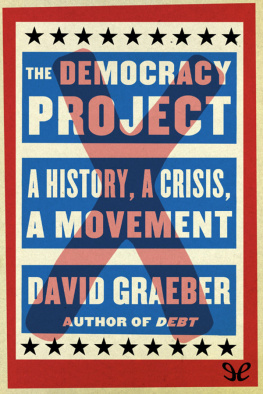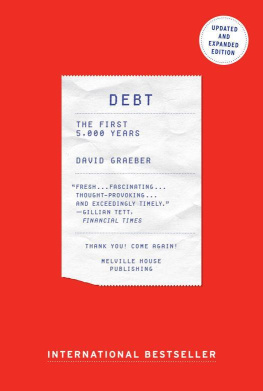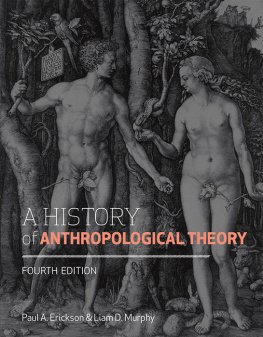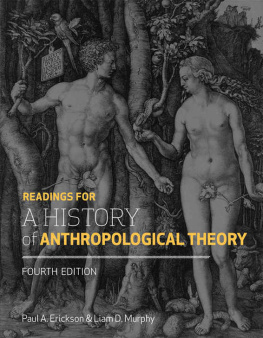Graeber - Toward An Anthropological Theory of Value: The False Coin of Our Own Dreams
Here you can read online Graeber - Toward An Anthropological Theory of Value: The False Coin of Our Own Dreams full text of the book (entire story) in english for free. Download pdf and epub, get meaning, cover and reviews about this ebook. City: New York, Gordonsville, year: Dec. 2001, publisher: Macmillan distributor, Palgrave Macmillan, genre: Religion. Description of the work, (preface) as well as reviews are available. Best literature library LitArk.com created for fans of good reading and offers a wide selection of genres:
Romance novel
Science fiction
Adventure
Detective
Science
History
Home and family
Prose
Art
Politics
Computer
Non-fiction
Religion
Business
Children
Humor
Choose a favorite category and find really read worthwhile books. Enjoy immersion in the world of imagination, feel the emotions of the characters or learn something new for yourself, make an fascinating discovery.
Toward An Anthropological Theory of Value: The False Coin of Our Own Dreams: summary, description and annotation
We offer to read an annotation, description, summary or preface (depends on what the author of the book "Toward An Anthropological Theory of Value: The False Coin of Our Own Dreams" wrote himself). If you haven't found the necessary information about the book — write in the comments, we will try to find it.
Toward An Anthropological Theory of Value: The False Coin of Our Own Dreams — read online for free the complete book (whole text) full work
Below is the text of the book, divided by pages. System saving the place of the last page read, allows you to conveniently read the book "Toward An Anthropological Theory of Value: The False Coin of Our Own Dreams" online for free, without having to search again every time where you left off. Put a bookmark, and you can go to the page where you finished reading at any time.
Font size:
Interval:
Bookmark:
The False Coin of Our Own Dreams
David Graeber
T OWARD AN A NTHROPOLOGICAL T HEORY OF V ALUE
Copyright David Graeber, 2001. All rights reserved. No part of this bookmay be used or reproduced in any manner whatsoever without written permission except in the case of brief quotations embodied in critical articles orreviews.
First published 2001 by PALGRAVE
175 Fifth Avenue, New York, N.Y. 10010 and
Houndmills, Basingstoke, Hampshire, England RG21 6XS.Companies and representatives throughout the world.
PALGRAVE is the new global publishing imprint of St. Martins Press LLCScholarly and Reference Division and Palgrave Publishers Ltd. (formerlyMacmillan Press Ltd).
ISBN 0-312-24044-9 (cloth)ISBN 0-312-24045-7 (paperback)Library of Congress Cataloging-in-Publication Data
Graeber, David
Toward an Anthropological Theory of Value: The False Coin of Our OwnDreams
p.cm.
Includes bibliographical references and index.
ISBN 0-312-240449 ISBN 0-312-24045-7 (alk. paper)1. Values.2. AnthropologyPhilosophy.3. Social values.
4. Ceremonial exchange.I. Title.
GN469.5.G732001
303.372dc21
200121794
Design by Letra Libre, Inc.
First edition: December 2001
10987654321Printed in the United States of America.
Chapter 1
Chapter 2
Chapter 3
Chapter 4
Chapter 5
Chapter 6
Notes
Current Directions in Exchange Theory23
Value as the Importance of Actions49
toward a Theory of Wealth and Power91
Wampum and Social Creativity among the Iroquois117
Marcel Mauss Revisited151
or the Problem of the Fetish, IIIB229
263
The belief of all, faith, is the effect of the need of all, of their unanimousdesires. Magical judgment is the object of a social consent, the translationof a social need.... It is because the effect desired by all is witnessed byall that the means are acknowledged as apt to produce the effect. It is because they desired the healing of the feverish patients that sprinklings ofcold water and sympathetic contact with a frog seemed to the Hindus whocalled on the Brahmins of the Atharva-veda sufficient antagonists tothird- or fourth-degree fever. In short, it is always society that pays itselfin the counterfeit money of its dreams.
from Marcel Mauss and Henri Hubert, Mana and Magic(1904, trans. Loic Wacquant)t feels a little silly writing acknowledgements for a book like this, an intellectual project at least fifteen years in the making. The logical thingwould perhaps be to thank everyone I've ever known, because you never
know where your ideas really came from. There are two names though thatI really ought to mention: my oldest friend, Stuart Rockefeller, an intellectual companion since high school, and Nhu Thi Le, whose mind for the lastsix has touched everything mine has. Any idea you read in here might verywell actually have been invented by one of them; in many cases, perhapsmost, they are really joint projects that all three of us, and probably others,are equally responsible for. (Except for the parts that are just dumb: I hadnothing to do with those!)
Aside from that I must acknowledge the professors and staff and studentsof the anthropology department of the University of Chicago when I wasthere, who produced an environment that actually encouraged people tothink for themselves and experiment with ideas, something surprisingly rarein academia; my fellow workers at Crerar; my colleagues and students atHaverford, NYU, and Yale; and my comrades in the direct action movementhere and abroad who give me hope for humanity, and with whom I havespent so many pleasant hours tearing down walls. Oh, and my parents, whomade me who I am.
And my brother Eric. And Kristi Long, the best editor who ever lived,and everyone at Palgrave (except whoever it was who made me switcharound the title).
This page intentionally left blankhen I originally set out to write this book, the goals I had inmind were relatively modest. I was interested, first of all, inmaking a contribution to anthropological theories of value.
Many anthropologists have long felt we really should have a theory of value:that is, one that seeks to move from understanding how different culturesdefine the world in radically different ways (which anthropologists have always been good at describing) to how, at the same time, they define what isbeautiful, or worthwhile, or important about it. To see how meaning, onemight say, turns into desire. To be able to do so promises to resolve a lot ofnotoriously thorny problems not only in anthropology but also in social science more generally. I wanted to see if I could map out at least the outlinesof such a theory and also, to relate them to certain ideas about wealth andpower and the nature of money that I had first set out in an essay severalyears before (Graeber 1996).
In the course of writing, however, something started happening. Themore I wrote, the more I was forced to confront the fact that my own assumptions and priorities were in many ways diametrically opposed to muchof what now stands as common wisdom in the social sciencesor at leastthose disciplines (sociology, anthropology, history, cultural studies, etc.) thatsee themselves as most politically engaged. As I found myself increasinglyobliged to clarify points of difference, I realized the book was turning intosomething much more ambitious: in some ways, it was acquiring the qualities of political tract, or at least, an extended reflection on the relation between disciplines like anthropology and politics.
The standard historythe sort of thing a journalist would take as self-evident factis that the last decades of the twentieth century were a time whenthe American left largely retreated to universities and graduate departments,spinning out increasingly arcane radical meta-theory, deconstructing everything in sight, as all around them, the rest of the world became increasinglyconservative. As a broad caricature, I suppose this is not entirely inaccurate.
xToward an Anthropological Theory of ValueBut recent events suggest there might be very different ways to tell this story.The last several years have seen the rapid growth of new social movementsparticularly, movements against neoliberalism (in the United States referredto as free market ideologies)in just about every corner of the world, including, somewhat belatedly, the United States itself. Yet the so-called academic left in America has played almost no role in this; in fact, many of itspresumed members seem only vaguely aware that such movements exist. Perhaps this is not all that surprising: neoliberalism itself remains a subject onwhich modern critical meta-theory has never had very much to say.
But why is that? It seems to me that in a surprising variety of ways, thiscritical theory actually anticipated neoliberal arguments. Take, for example,the concept of postmodernism. Now, admittedly this is a somewhat trickyone because there were never many scholars willing to actually call themselves postmodernists. But in a way, this was precisely what made the termso powerful: postmodernism was not something anyone was proposing buta fait accompli that everyone simply had to accept. From the 80s on, it hasbecome common to be presented with a series of arguments that might besummarized, in caricature form, as something like this:
1.We now live in a Postmodern Age. The world has changed; no one isresponsible, it simply happened as a result of inexorable processes;neither can we do anything about it, but we must simply adopt ourselves to new conditions.
Font size:
Interval:
Bookmark:
Similar books «Toward An Anthropological Theory of Value: The False Coin of Our Own Dreams»
Look at similar books to Toward An Anthropological Theory of Value: The False Coin of Our Own Dreams. We have selected literature similar in name and meaning in the hope of providing readers with more options to find new, interesting, not yet read works.
Discussion, reviews of the book Toward An Anthropological Theory of Value: The False Coin of Our Own Dreams and just readers' own opinions. Leave your comments, write what you think about the work, its meaning or the main characters. Specify what exactly you liked and what you didn't like, and why you think so.

